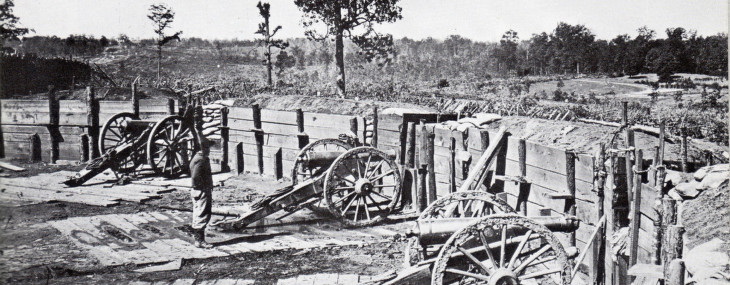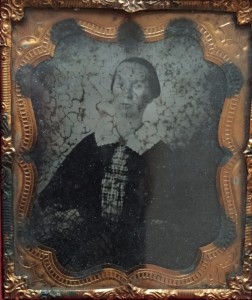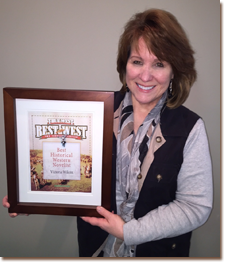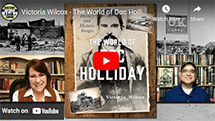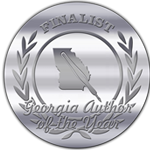Although John Henry “Doc” Holliday grew up in Georgia during the Civil War as the son of a Confederate officer, the closest he got to the action himself was seeing troops marching through his hometown of Griffin, location of two Confederate training camps. When his father returned home early from the war on a medical discharge, the family left Griffin and moved south to the little village of Valdosta, close by the Florida border and far from the advancing Yankee army. But other members of the family had a much closer view of the war, and their stories became part of his childhood memories – like the story of his Uncle Robert Kennedy Holliday (father of Cousin Mattie) who served under General Longstreet at Gettysburg, and Rob’s wife, Aunt Mary Anne Fitzgerald Holliday, who was home with the children in Jonesboro when Sherman’s Army marched south from Atlanta. With an army approaching and the road “filled with bluecoats,” Mary Anne took her children away to her uncle’s plantation for safety. The following comes from Mattie in her “Memoirs of the Holliday Family in Georgia”:Continue reading
Holliday
Stories
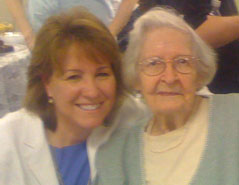
Sunset for a Southern Lady
I first met Susie in a filing cabinet at the old Margaret Mitchell Library in Fayetteville, Georgia. Not that she was actually in the filing cabinet, of course. It was her book I discovered there, tucked away in a file labeled “Holliday Family,” and where I was searching for information for the newly begun restoration of the circa 1855 Holliday House in Fayetteville, forty miles south of Atlanta. The house was a classic antebellum beauty, with tall white columns across a wide front veranda, a breezeway between the twin parlors, fireplaces in every one of the eight large rooms and hand-blown glass in the multi-paned windows. But it was an aging beauty: 150 years old and being considered for demolition when I found it and fell in love and started up a community action group and then a non-profit organization to save it and restore it as a museum of Fayette County history. As the home of a Civil War-era doctor, it was interesting enough, but with the family’s connections to Gone With the Wind and Doc Holliday, it seemed a priceless piece of Georgia’s history.Continue reading
Holliday
Stories
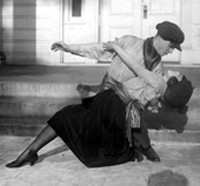
Dancing with Doc Holliday and Rhett Butler
I’ve always found it kind of neat that I was born on Margaret Mitchell’s birthday, November the 8th. Gave me an interesting connection to the writer I so admired from the first time I read Gone With the Wind as a young teen. Don’t remember the year, but do remember how I loved living in the world she created – and how I hated the ending she gave me! No romance with Ashley, whom I adored (so much more interesting in the book than in the movie, sorry Leslie Howard)! Just a shocking, “I don’t give a damn,” from Rhett at the end of those 1200 captivating pages.
Of course, I wanted to fix that awful ending, and imagined how the book should have gone. Being a born writer (well, as long as I can remember, anyhow), it didn’t seem like too much of a task to me. Just pick up the story where Margaret left off, following Rhett down the street to his own adventures before meeting up again with Scarlett. This was before the copycat novels Scarlett and Rhett Butler’s People tried to do the same thing, and my version was sooooo much better! Rhett would return to New Orleans (not Charleston, as in those other books), where his secret son with Belle Watling has been living in a fancy boarding school. That was Belle’s idea, not wanting her son to know who his mother really was, and Rhett went along with her plan, not sure how to tell the fine Butler family that there is an heir born of a prostitute…
Hmm. Seems like a theme that appears elsewhere in my writing. Maybe I get that nobleman-in-disguise storyline from another childhood favorite of mine, Mark Twain’s The Prince and the Pauper (Mark Twain himself shows up in several places in my The Saga of Doc Holliday). Fiction is derivative, after all, as a writer can only write what she’s lived or read or otherwise imagined.Continue reading
